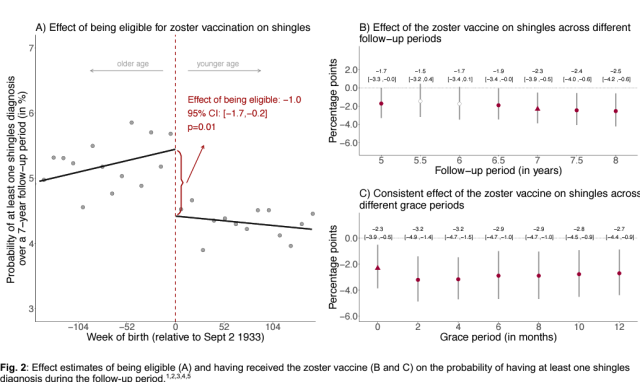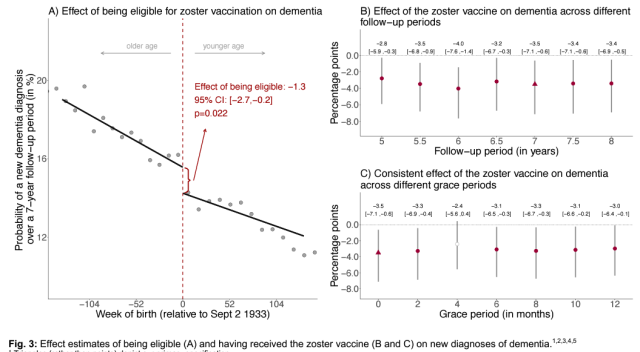Can shingles virus vaccine reduce the incidence of Alzheimer’s disease?
- Normal Liver Cells Found to Promote Cancer Metastasis to the Liver
- Nearly 80% Complete Remission: Breakthrough in ADC Anti-Tumor Treatment
- Vaccination Against Common Diseases May Prevent Dementia!
- New Alzheimer’s Disease (AD) Diagnosis and Staging Criteria
- Breakthrough in Alzheimer’s Disease: New Nasal Spray Halts Cognitive Decline by Targeting Toxic Protein
- Can the Tap Water at the Paris Olympics be Drunk Directly?
Can shingles virus vaccine reduce the incidence of Alzheimer’s disease?
- Should China be held legally responsible for the US’s $18 trillion COVID losses?
- CT Radiation Exposure Linked to Blood Cancer in Children and Adolescents
- FDA has mandated a top-level black box warning for all marketed CAR-T therapies
- Can people with high blood pressure eat peanuts?
- What is the difference between dopamine and dobutamine?
- How long can the patient live after heart stent surgery?
Stanford University: Can shingles virus vaccine reduce the incidence of Alzheimer’s disease?
Alzheimer’s disease (AD, also known as senile dementia in China) is a disease that seriously affects the elderly and is characterized by decreased cognitive level and memory loss, often causing great pain to patients and their families.
At present, the US FDA has only approved two drugs that slightly delay the progression of the disease, but there is no way to prevent the occurrence of AD.
Long-term cohort study is an efficient tool to find the related factors of AD pathogenesis and further explore the causal relationship.
On May 25, 2023, a very important research was uploaded to medRxiv, which attracted a lot of attention [1].
It has been hypothesized that Alzheimer’s disease (AD) is related to viral infection, and this study analyzed the shingles vaccine (Zostavax) vaccination of the whole population in Wales, UK, and found that Zostavax vaccination can reduce the incidence of Alzheimer’s disease by 19.9 % % .

The research is interesting because in Wales a high proportion of the population had been vaccinated before 2 September 1933, and people had not been vaccinated after that date.
The study found a cohort born in 1933 for a case-control study. Only 0.01% of one cohort had been vaccinated with Zostavax, and the other cohort with an average age difference of only one week had 47.2% of people vaccinated with Zostavax.
During the 7-year follow-up, the incidence of AD differed by 3.5% (p=0.019), corresponding to a 19.9% reduction in the incidence of AD .

This suggests that herpes zoster virus vaccine can reduce the incidence of AD.
Expert comments:
Clinical significance of this study:
The results of this study clearly show that the herpes zoster vaccine can significantly reduce the incidence of dementia ; this finding reveals the great potential that the herpes zoster vaccine may have in preventing and delaying dementia.
The results of this study strongly suggest that varicella-zoster virus may play an important role in the pathogenesis of dementia .
Clinical research inspiration:
Based on this study, further randomized controlled trials (RCTs) are needed to determine the optimal population and time interval for herpes zoster vaccination to prevent or delay dementia, and the extent of the causal effect when more precise measures of cognition are used.
The most practical inspiration is that a large number of high-quality studies have shown that patients infected with the new coronavirus have sustained inflammatory responses in the brain ; whether these patients may have a higher probability of AD is unclear. Doing a good job at the moment is the basis for high-quality research in the future.
New study reveals that even mild infection with the new coronavirus can trigger long-lasting neuroinflammation
references:
1. https://www.medrxiv.org/content/10.1101/2023.05.23.23290253v1.full.pdf
Can shingles virus vaccine reduce the incidence of Alzheimer’s disease?
(source:internet, reference only)
Disclaimer of medicaltrend.org
Important Note: The information provided is for informational purposes only and should not be considered as medical advice.



